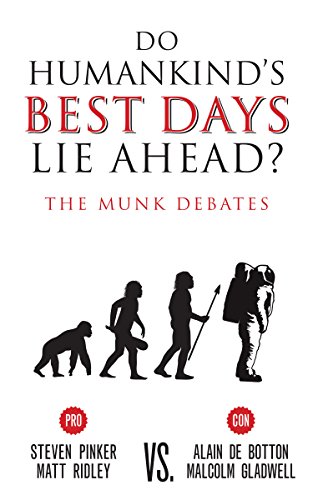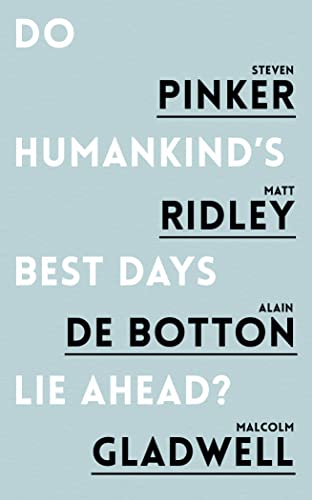steven pinker matt ridley alain (5 Ergebnisse)
FeedbackSuchfilter
Produktart
- Alle Product Types
- Bücher (5)
- Magazine & Zeitschriften (Keine weiteren Ergebnisse entsprechen dieser Verfeinerung)
- Comics (Keine weiteren Ergebnisse entsprechen dieser Verfeinerung)
- Noten (Keine weiteren Ergebnisse entsprechen dieser Verfeinerung)
- Kunst, Grafik & Poster (Keine weiteren Ergebnisse entsprechen dieser Verfeinerung)
- Fotografien (Keine weiteren Ergebnisse entsprechen dieser Verfeinerung)
- Karten (Keine weiteren Ergebnisse entsprechen dieser Verfeinerung)
- Manuskripte & Papierantiquitäten (Keine weiteren Ergebnisse entsprechen dieser Verfeinerung)
Zustand Mehr dazu
- Neu (Keine weiteren Ergebnisse entsprechen dieser Verfeinerung)
- Wie Neu, Sehr Gut oder Gut Bis Sehr Gut (1)
- Gut oder Befriedigend (4)
- Ausreichend oder Schlecht (Keine weiteren Ergebnisse entsprechen dieser Verfeinerung)
- Wie beschrieben (Keine weiteren Ergebnisse entsprechen dieser Verfeinerung)
Einband
- alle Einbände
- Hardcover (Keine weiteren Ergebnisse entsprechen dieser Verfeinerung)
- Softcover (5)
Weitere Eigenschaften
- Erstausgabe (Keine weiteren Ergebnisse entsprechen dieser Verfeinerung)
- Signiert (Keine weiteren Ergebnisse entsprechen dieser Verfeinerung)
- Schutzumschlag (Keine weiteren Ergebnisse entsprechen dieser Verfeinerung)
- Angebotsfoto (Keine weiteren Ergebnisse entsprechen dieser Verfeinerung)
Sprache (1)
Preis
- Beliebiger Preis
- Weniger als EUR 20
- EUR 20 bis EUR 45 (Keine weiteren Ergebnisse entsprechen dieser Verfeinerung)
- Mehr als EUR 45 (Keine weiteren Ergebnisse entsprechen dieser Verfeinerung)
Gratisversand
Land des Verkäufers
Verkäuferbewertung
-
Do Humankind's Best Days Lie Ahead? : The Munk Debates
Anbieter: Better World Books, Mishawaka, IN, USA
EUR 8,05
Währung umrechnenKostenlos für den Versand innerhalb von/der USAAnzahl: 1 verfügbar
In den WarenkorbZustand: Good. Former library book; may include library markings. Used book that is in clean, average condition without any missing pages.
-
Do Humankind's Best Days Lie Ahead?
Anbieter: Better World Books Ltd, Dunfermline, Vereinigtes Königreich
EUR 5,38
Währung umrechnenEUR 9,19 für den Versand von Vereinigtes Königreich nach USAAnzahl: 3 verfügbar
In den WarenkorbZustand: Very Good. Ships from the UK. Former library book; may include library markings. Used book that is in excellent condition. May show signs of wear or have minor defects.
-
Do Humankind's Best Days Lie Ahead?
Anbieter: Better World Books Ltd, Dunfermline, Vereinigtes Königreich
EUR 5,38
Währung umrechnenEUR 9,19 für den Versand von Vereinigtes Königreich nach USAAnzahl: 3 verfügbar
In den WarenkorbZustand: Good. Ships from the UK. Former library book; may include library markings. Used book that is in clean, average condition without any missing pages.
-
EUR 5,47
Währung umrechnenEUR 9,99 für den Versand von Spanien nach USAAnzahl: 1 verfügbar
In den WarenkorbZustand: Muy bueno. : En este libro, Steven Pinker, Matt Ridley, Alain de Botton y Malcolm Gladwell, cuatro de los pensadores más renombrados del mundo, se enfrentan en un debate sobre si la humanidad se acerca a una edad de oro impulsada por la tecnología y las redes globales, o si la noción de progreso es una ilusión occidental. Los autores exploran la evolución de las instituciones, las innovaciones y las ideas, y si la condición humana está mejorando o simplemente cambiando. Este libro ofrece una perspectiva entretenida y estimulante sobre uno de los debates más importantes de la era moderna. EAN: 9781786070760 Tipo: Libros Categoría: Filosofía Título: Do Humankind's Best Days Lie Ahead? Autor: Steven Pinker| Matt Ridley| Alain de Botton| Malcolm Gladwell Editorial: Oneworld Publications Idioma: en Páginas: 128 Formato: tapa blanda.
-
EUR 6,90
Währung umrechnenEUR 19,60 für den Versand von Neuseeland nach USAAnzahl: 1 verfügbar
In den WarenkorbPaperback. Zustand: Good. From the Enlightenment onwards, the West has had an enduring belief that through the evolution of institutions, innovations, and ideas, the human condition is improving. This process is supposedly accelerating as new technologies, individual freedoms, and the spread of global norms empower individuals and societies around the world. But is progress inevitable? Its critics argue that human civilization has become different, not better, over the last two and a half centuries. What is seen as a breakthrough or innovation in one period becomes a setback or limitation in another. In short, progress is an ideology not a fact; a way of thinking about the world as opposed to a description of reality. So is the cup half full or half empty? 128 pages.



